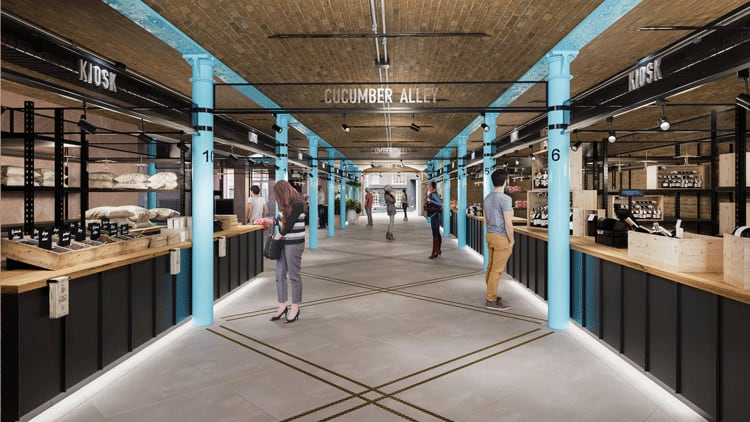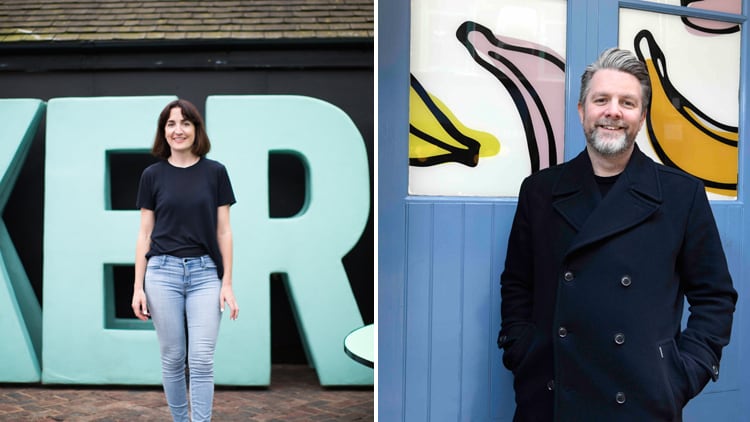Tell us about Seven Dials Market
Simon Mitchell: It’s a market and food hall split into two areas. There will be Cucumber Alley with independent traders such as a butcher’s, a bakery and a florist, which you can wander through almost without realising, and then a separate restaurant space split over two floors. At the top there will be operators including Monty’s Deli, Claw, Club Mexicana and cheese conveyor belt restaurant Pick & Cheese, while down below will be traders such as Ink, Nanban, Yum Bun and Strozzapreti, a new pasta concept from the people behind Franco Manca.
What's the vibe going to be like?
Petra Barran: Although it’s a beautiful and stylish space, we want it to feel quite playful. It’s going to be exploratory and accessible.
SM: The big thing for us is not to be dry. It will have a big kick-ass sound system and a stage. And while it will look quite slick, we won’t be taking ourselves too seriously – there will be a bright pink lift and we had to tell our landlord we were going to cover this amazing building in giant bananas.
It's Kerb's first bricks and mortar location. How has it come about?
SM: We’ve always wanted a permanent base for KERB as somewhere for our traders to graduate to. I fell in love with this building as I used to walk past it often and gaze through the windows and think it would be unbelievable as a food hall. We contacted [the landlord] Shaftesbury, told them the idea, and it happened quickly from there.
What's the idea behind it?
SM: We were separately looking at KERB as a business and what it stands for. In the beginning, Petra got together the best street food traders in London and organised them into an amazing collective that evolved into a membership organisation. The idea was to champion street food as a thing, but that’s done now. We now exist as a business incubator; we find people who want to become a food business and give them the tools to do so, through workshops and then our incubator scheme. Lots of people have gone on to build brilliant businesses and we want to make that transition easy. Opening a restaurant costs hundreds of thousands of pounds, so this is a step between street food and a restaurant that de-risks that step.
There's 13 traders here, but Kerb has hundreds of members. How did you decide on the line-up?
SM: All our KERB traders were shown it first and asked to apply. From that list we looked for quality and variety and also who was ready to make the leap. Strozzapreti and Nanban are the only two who haven’t previously traded with KERB. The reason for that is you can’t easily do pasta or ramen in a street food market, but we wanted both. It’s what Londoners eat.
PB: We had a pasta guy at KERB years ago who set fire to his gazebo, it was absolutely terrifying.
And there's two very different restaurant spaces...
SM: There’s no extraction upstairs at all, it’s all A1 units, whereas downstairs it’s all A3. That influenced our choice of traders. It was a challenge we turned into an opportunity. That’s why we have the cheese conveyor belt restaurant upstairs, as well as a coffee shop and a temperance bar, which is run by Square RootSoda. We wanted to do poke and Fabian [Clark] from [seafood concept] Claw pitched a poke concept but we said to do a Claw instead because that’s what he’s famous for.
A number of food halls have opened in the capital recently. Can London sustain them all?
SM: People say there are a lot of food halls but there aren’t that many. We went to New York two years ago and there were 20 there, and there’s only five or six in London. We’re catching up with other cities and there’s room for more. It’s how people want to eat now, it’s more sociable.
PB: Clustering is the whole mantra of the KERB business, it’s a human instinct to cluster. It’s great to open a restaurant miles away from anyone else if you can get good rent, but the reality is people aren’t necessarily going to go there as there’s not enough reason to. It’s giving people plenty of reason to come somewhere.

What are the terms for traders?
SM: They get a kitchen area (that they kit out themselves) and prep space. We take a fair percentage of turnover and a small deposit. There is also a service charge because we have to run a distribution centre; you can’t have lots of different businesses having four deliveries a day in Seven Dials, so we have a centre in Leyton for all dry goods that delivers daily. We offer short licences so if it doesn’t work traders can leave early and someone else can come in. The idea is for the market to be an intermediate space, for maybe a year or two, to help people get that permanent restaurant and then make space for the next trader.
What about dish pricing?
SM: The traders have full control over what they charge. We did have a session where we told them the average dish price here, as well as the cheapest and most expensive, but it’s not our place to tell people what they should be charging. They know what it costs and what it’s worth. We will have some really accessible dishes and some more expensive ones.
The KERB branding is subtler here, why's that?
SM: We want Seven Dials Market to be woven into the fabric of London like Borough Market or Spitalfields.
PB: It’s place-making. It’s important for the locals and workers to feel like it belongs here.
This is a web version of an article that first appeared in the September issue of Restaurant magazine, the leading title for the UK's restaurant industry. For more features, comment, interviews and in-depth analysis of the restaurant sector subscribe to Restaurant magazine here.

